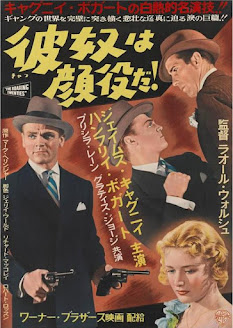 The First World War has ended. Eddie Bartlett (James Cagney) returns to New York City to find all the jobs gone - taken by the men who remained home during the war. As The Roaring Twenties (1939) begin, Eddie falls into a new career - bootlegging - and enters into the world of organized crime.
The First World War has ended. Eddie Bartlett (James Cagney) returns to New York City to find all the jobs gone - taken by the men who remained home during the war. As The Roaring Twenties (1939) begin, Eddie falls into a new career - bootlegging - and enters into the world of organized crime.A great deal of our conversation centered on Jean Sherman (Priscilla Lane). I, for one, find her hard to like or sympathize with. From the start, we discover she is a liar (she'd misled Eddie into thinking she was a woman in her twenties, when she is actually a high school student). She's self-centered, caring only for her career, and very willing to use Eddie to get ahead. She's well aware that he loves her. She tells him she doesn't love him, yet she takes expensive gifts from him, while she carries on a relationship with Lloyd Hart (Jeffrey Lynn). Because she is played by Ms. Lane, who is an engaging actress, you want to like her, but Jean is a passive person, who floats from man to man. One wonders why all these men are smitten with her; it is perhaps because they are that we get distracted from the reality of Jean - that she is a thoughtless woman who likes Eddie because of what she can get from him. Perhaps the character needed a firmer hand in the writing; as written, she's not a person that one can countenance.
Gladys George, however, is perfect as Panama Smith. She was not the first choice for the part - it was originally intended for Ann Sheridan; Lee Patrick and Glenda Farrell had also been cast at various points (The Films of James Cagney by Homer Dickens). It is hard to imagine any of them playing the character. Panama's love for Eddie is selfless - she is truthful with him, even when he doesn't want to hear it (especially about Jean). With her husky voice, it's easy to accept her as a "tuneless canary" (the name given to her by a minor character); she also is the epitome of the tough broad after which she was patterned - Texas Guinan.
Also worth noting is the performance of Frank McHugh (Danny Green). A gentle man who gets pulled into bootlegging through his friendship with Eddie, he's too kind for the business and eventually pays the price. Mr. McHugh gives him a simplicity and sympathy that makes him believable. Jeffrey Lynn (Lloyd Hart), on the other hand, has the thankless task of being "the other man." Like Jean, Lloyd works with Eddie, while protesting his distaste for the business. It's not a great part because the character is very underwritten.
New York reporter Mark Hellinger wrote the 1938 story The World Moves On, on which the film is based. He was writing about real people that he had encountered (AFI catalog). Mr. Hellinger also served as a producer on the film.
The New York Times review by Frank S. Nugent was not enthusiastic, however he praised both Mr. Cagney and Ms. George (who "breathed poignance into the stock role of the night club hostess") for their work. Given that it was released in 1939 (and had stiff competition), no Oscar nominations were given, but Mr. Cagney won the National Board of Review for Best Actor. On a side note, Carol Burnett did her own take on the story as "The Boring Twenties." As always, Ms. Burnett (as Panama Smith) is hysterical.
This is an engaging film; if you are an admirer of Mr. Cagney or Ms. George, it is an essential. It was also one of my father's favorite films. We'll leave you with a trailer to introduce you to the action:



No comments:
Post a Comment
Thanks for your interest in this blog. Your comments will be moderated to minimize spam to the website. Thanks for understanding.